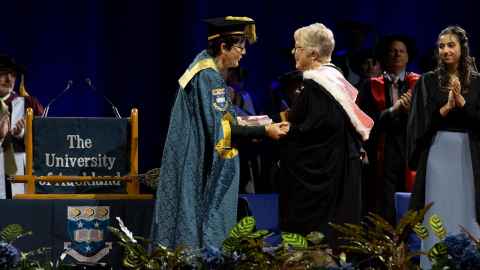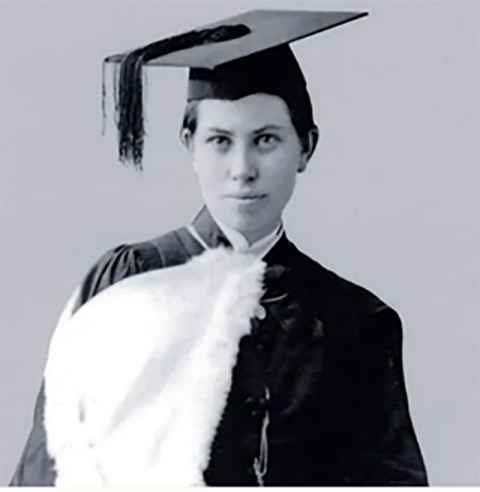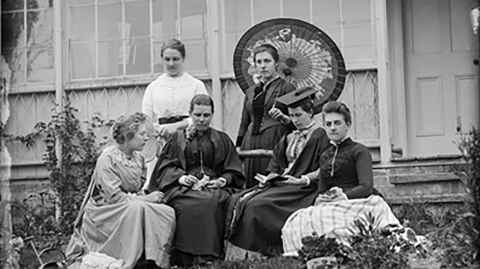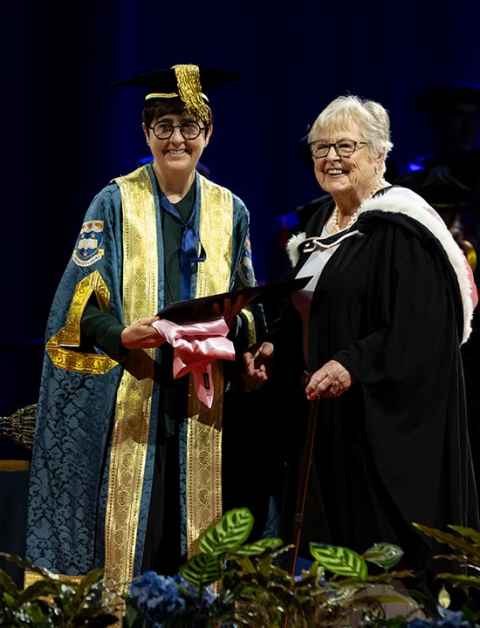Higher education pioneer given honorary doctorate
19 September 2023
A trailblazer for women in higher education, Kate Milligan Edger has been given a posthumous honorary doctorate from Waipapa Taumata Rau, University of Auckland as part of its 140th anniversary commemorations.

Some extraordinary New Zealanders are being acknowledged for their contributions to education, the University of Auckland and the wider community, with the first posthumous honorary doctorates ever conferred by the University.
Jill Smith, the granddaughter of suffragette and women’s rights advocate Kate Edger (1857 – 1935), accepted an Honorary Doctor of Literature on behalf of the woman whose name adorns the University’s Student Information Commons at the University's spring graduation ceremony on 19 September, the 130th anniversary of women’s suffrage in Aotearoa.
On 11 July 1877, Kate Milligan Edger became the first woman in New Zealand to gain a university degree and the first woman in the British Empire to receive a Bachelor of Arts (Mathematics and Latin). At her graduation, more than a thousand people turned out to witness the occasion; Kate the only woman on the stage.
Jill says she’d be absolutely amazed at seeing today’s vast arena with thousands of male and female graduates, and knowing that today, almost 60 percent of students at the University identify as women.
“By overcoming the significant barriers women faced to pursue higher education and lead independent lives, Kate Edger blazed a trail for many others to follow,” she says.
Kate always felt that education was not just about the acquisition of knowledge for its own sake, says Jill, but should also build up the student’s moral character and that intellectual training would make “true women, when it is combined with the training of the heart and the soul”.
“She would be very, very proud that the university is honouring her with this degree and would be grateful, as am I; a proud granddaughter whom she has inspired, as she has with so many women over the years.”

Kate was born in Berkshire, England and with her family, emigrated to New Zealand in 1862. Her father, Reverend Samuel Edger, had ideas about female education and emancipation that were radical for his time; Kate and her three sisters were raised in a household where young women were encouraged to develop their minds, not just their marriage potential.
The young Edger girls were initially educated by their father at home, but later he obtained permission from the headmaster of Auckland College and Grammar School (now Auckland Grammar School) for Kate to study with its top class of boys.
As the only female in the class, Kate said she was treated with courtesy by the other students but was required to enter the class “with downcast eyes” so as not to attract undue attention.
In 1874, she successfully passed a university scholarship exam and enrolled at university using only her initials, 'K. M. Edger.' She was admitted because it was assumed she was a man.
After completing her BA at Auckland and her MA at Canterbury College, she was appointed the first principal of Nelson College for Girls where she taught English grammar, composition and literature, physical science, Latin, mathematics, singing and geography, as well as preparing senior girls for university scholarships.
After her marriage to William Evans, and move to Wellington, she combined running a private school for girls, adult literacy classes, examining for university entrance, suffrage and temperance activities and community work.
She strongly supported women’s suffrage and until the early 1930s, was active in the Women’s Christian Temperance Union. She was also heavily involved in the New Zealand Society for the Protection of Women and Children and the National Council of Women and was awarded the King’s Silver Jubilee Medal shortly before her death in May, 1935.

Throughout her life, Kate Edger was a champion for quality education for girls and women and was an active suffragist. She firmly believed that women’s active participation in all aspects of public life and politics would help improve society.
“Kate would be so very pleased that her life work in the education of women, and her work in the political, social and humanities had been so recognised,” says Jill.
“She would be so encouraged that women have taken their place in society, equal with men - especially having female prime ministers.
“Although I do think she would be puzzled why it’s taking so long to achieve pay parity with men. And I’m sure she would be horrified that her work with the Society for the Protection of Women and Children was still not resolved, and in fact the situation appears to have worsened."
University of Auckland Provost, Professor Valerie Linton, says the University today is built upon the work and the academic hurdles overcome by those who have gone before.

“We are committed to accelerating our progress towards gender equity, in this, our 140th year. We are inspired by Kate Edger, and proud to acknowledge her legacy with an honorary degree.”
In 2005, the New Zealand Federation of Graduate Women renamed its Auckland branch after Kate Edger.
The Kate Edger Educational Charitable Trust is devoted to advancing women in higher education across all academic disciplines and has provided more than $6 million in donations to students for fees, expenses and retraining.
And in 2003, the University of Auckland opened the Kate Edger Information Commons. Located in the student quad on City Campus, it's regarded internationally as an innovative teaching and learning environment and a proud legacy of its namesake.